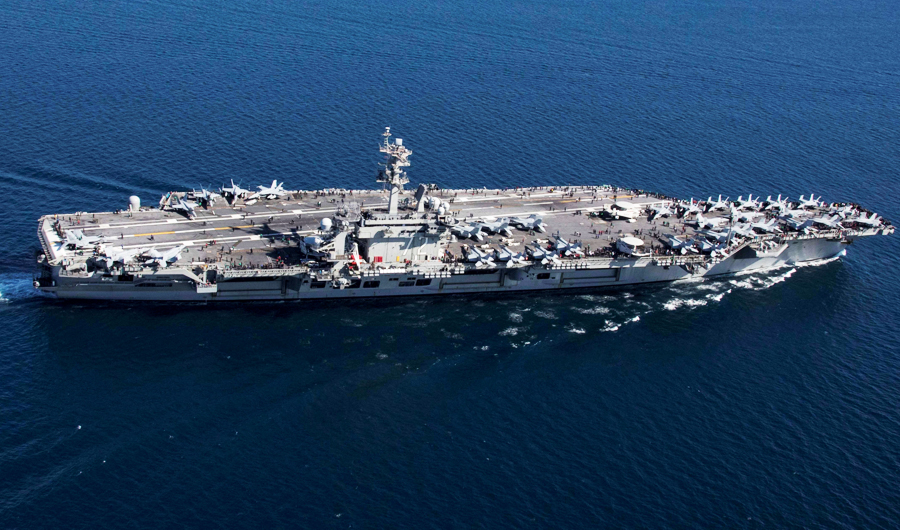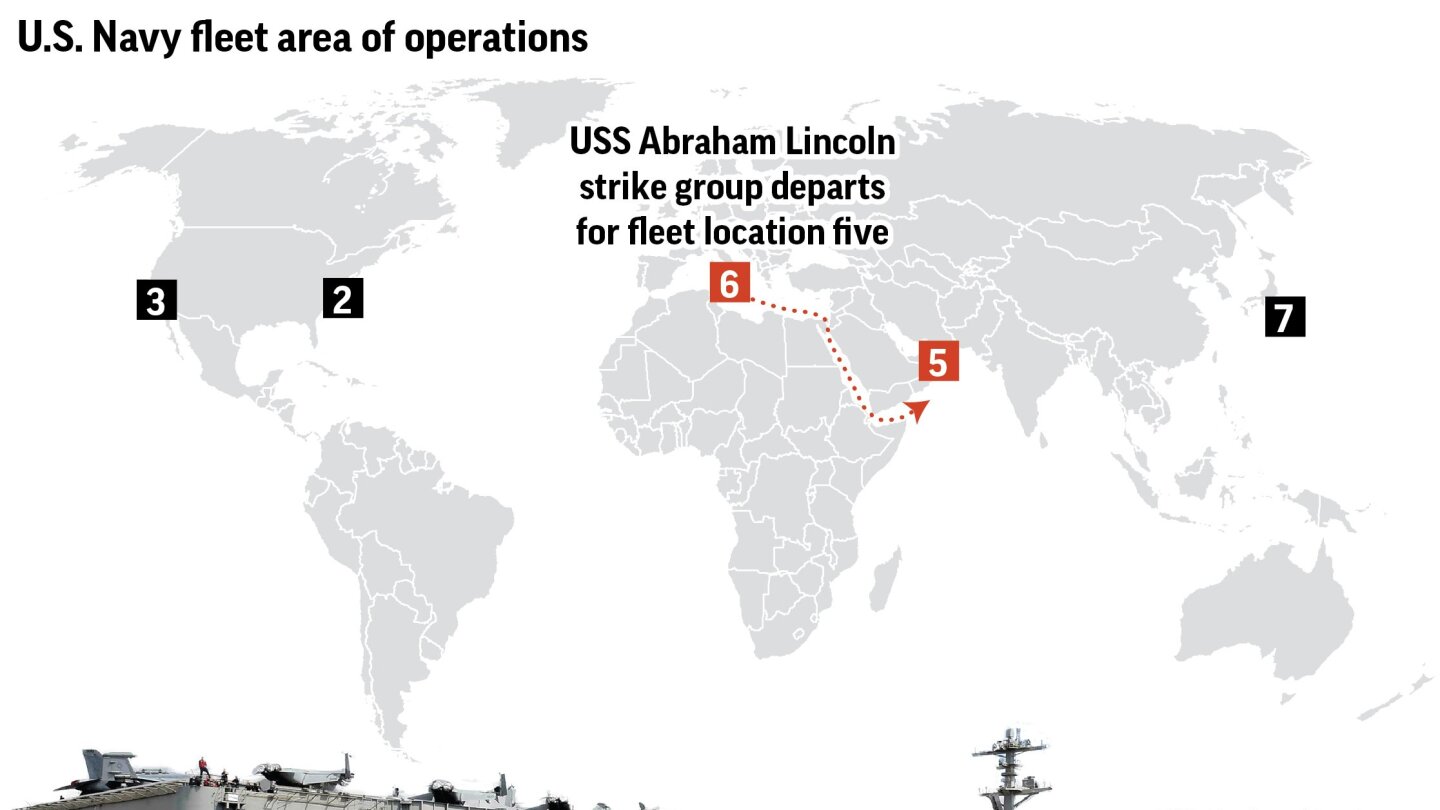Congressional leaders get classified briefing on Iran
By SUSANNAH GEORGE
17 May 2019

Senate Majority Leader Mitch McConnell, R-Ky., passes reporters as he and other top congressional leaders head to a classified briefing on Iran after members of both parties asked for more information on the White House's claims of rising threats in the Middle East, at the Capitol in Washington, Thursday, May 16, 2019. President Donald Trump said Thursday that he hopes the U.S. is not a path to war with Iran following a series of administration statements and actions that have alarmed American allies. (AP Photo/J. Scott Applewhite)
WASHINGTON (AP) — Congressional leaders received a classified briefing on Iran from the White House Thursday following criticism that lawmakers have been kept out of the loop about recent military moves in the Middle East.
Members of the so-called Gang of Eight were tight-lipped as they left the briefing. The ranking member of the Senate intelligence committee, Sen. Mark Warner of Virginia, refused to comment on the classified information discussed, but said more lawmakers should be informed of the Iran threat.
“I think obviously there are certain protections that have to be maintained for Gang of Eight but it’s very important that more members hear this story,” Warner told reporters.
Classified briefings on Iran will also be given next week to the full House and Senate.
Frustration has been mounting in Congress about the lack of consultation from the White House after the Trump administration sent military assets to the Middle East to protect U.S. interests and on Wednesday partially evacuated the U.S. embassy in Baghdad.
Asked Thursday at the White House if escalating tensions with Iran will lead to war, Trump replied, “I hope not.”
Speaking from the Senate floor, Republican Sen. Marco Rubio of Florida defended the White House’s actions. Rubio, a member of the Senate intelligence committee, described “a persistent and clear stream of information” about Iranian threats to U.S. troops and other assets in the Middle East.
Iranian forces “and their proxies in the region pose a serious and potentially imminent threat to U.S. forces and U.S. civilians in Iraq and in the broader Middle East,” he said. Rubio also said he welcomed upcoming briefings and suggested that skepticism about the administration’s assessment of the Iran threat has been fueled by a lack of information.
Sen. Jim Risch of Idaho, the chairman of the Senate Foreign Relations Committee, said the White House raised the alarm on Iran after seeing multiple pieces of intelligence and that it wasn’t “a single item that (moved) the needle.”
“There’s been public reporting about the movement of rockets on a boat. ... I would caution, I would strongly caution everyone not to grab onto that and say ‘aha! This is it.’ That is the tip of the iceberg,” he said.
The Trump administration has taken a hard line on Iran. Trump pulled the U.S. out of the Iran nuclear deal last year and has re-imposed punishing sanctions that have crippled Tehran’s economy. Most recently the Trump administration designated Iran’s Revolutionary Guard Corps as a foreign terrorist organization in April.
Some lawmakers accused the White House of provoking Iranian retaliation.
“The Iranians moving weapons around is not a new thing and that they may be doing it at a more rapid pace after we have threatened them with a carrier strike group is not surprising,” said Rep. Jim Himes, D-Conn., a senior member of the House Intelligence Committee.
State Department officials said threats in the region were credible and based on intelligence showing Iranian-backed militias had been moving personnel and weaponry as well as stepping up surveillance of U.S. and U.S.-affiliated facilities in Iraq and other parts of the Middle East. The officials were not authorized to comment publicly by name and spoke only on condition of anonymity.
Members of Congress, senior U.S. officials and allies have expressed skepticism in response to warnings from the administration about Iran’s regional threat. Many lawmakers referenced the role of false intelligence in the lead-up to the 2003 invasion of Iraq when questioning current intelligence on Iran.
House Speaker Nancy Pelosi, a member of the Gang of Eight, said failure to inform Congress is “part of a pattern” for the Trump administration “that is not right” because the power to declare war resides with the Congress.
“So I hope that the president’s advisers recognize that they have no authorization to go forward in any way” against Iran, Pelosi said.
__
Associated Press writer Matthew Lee contributed to this report.
By SUSANNAH GEORGE
17 May 2019

Senate Majority Leader Mitch McConnell, R-Ky., passes reporters as he and other top congressional leaders head to a classified briefing on Iran after members of both parties asked for more information on the White House's claims of rising threats in the Middle East, at the Capitol in Washington, Thursday, May 16, 2019. President Donald Trump said Thursday that he hopes the U.S. is not a path to war with Iran following a series of administration statements and actions that have alarmed American allies. (AP Photo/J. Scott Applewhite)
WASHINGTON (AP) — Congressional leaders received a classified briefing on Iran from the White House Thursday following criticism that lawmakers have been kept out of the loop about recent military moves in the Middle East.
Members of the so-called Gang of Eight were tight-lipped as they left the briefing. The ranking member of the Senate intelligence committee, Sen. Mark Warner of Virginia, refused to comment on the classified information discussed, but said more lawmakers should be informed of the Iran threat.
“I think obviously there are certain protections that have to be maintained for Gang of Eight but it’s very important that more members hear this story,” Warner told reporters.
Classified briefings on Iran will also be given next week to the full House and Senate.
Frustration has been mounting in Congress about the lack of consultation from the White House after the Trump administration sent military assets to the Middle East to protect U.S. interests and on Wednesday partially evacuated the U.S. embassy in Baghdad.
Asked Thursday at the White House if escalating tensions with Iran will lead to war, Trump replied, “I hope not.”
Speaking from the Senate floor, Republican Sen. Marco Rubio of Florida defended the White House’s actions. Rubio, a member of the Senate intelligence committee, described “a persistent and clear stream of information” about Iranian threats to U.S. troops and other assets in the Middle East.
Iranian forces “and their proxies in the region pose a serious and potentially imminent threat to U.S. forces and U.S. civilians in Iraq and in the broader Middle East,” he said. Rubio also said he welcomed upcoming briefings and suggested that skepticism about the administration’s assessment of the Iran threat has been fueled by a lack of information.
Sen. Jim Risch of Idaho, the chairman of the Senate Foreign Relations Committee, said the White House raised the alarm on Iran after seeing multiple pieces of intelligence and that it wasn’t “a single item that (moved) the needle.”
“There’s been public reporting about the movement of rockets on a boat. ... I would caution, I would strongly caution everyone not to grab onto that and say ‘aha! This is it.’ That is the tip of the iceberg,” he said.
The Trump administration has taken a hard line on Iran. Trump pulled the U.S. out of the Iran nuclear deal last year and has re-imposed punishing sanctions that have crippled Tehran’s economy. Most recently the Trump administration designated Iran’s Revolutionary Guard Corps as a foreign terrorist organization in April.
Some lawmakers accused the White House of provoking Iranian retaliation.
“The Iranians moving weapons around is not a new thing and that they may be doing it at a more rapid pace after we have threatened them with a carrier strike group is not surprising,” said Rep. Jim Himes, D-Conn., a senior member of the House Intelligence Committee.
State Department officials said threats in the region were credible and based on intelligence showing Iranian-backed militias had been moving personnel and weaponry as well as stepping up surveillance of U.S. and U.S.-affiliated facilities in Iraq and other parts of the Middle East. The officials were not authorized to comment publicly by name and spoke only on condition of anonymity.
Members of Congress, senior U.S. officials and allies have expressed skepticism in response to warnings from the administration about Iran’s regional threat. Many lawmakers referenced the role of false intelligence in the lead-up to the 2003 invasion of Iraq when questioning current intelligence on Iran.
House Speaker Nancy Pelosi, a member of the Gang of Eight, said failure to inform Congress is “part of a pattern” for the Trump administration “that is not right” because the power to declare war resides with the Congress.
“So I hope that the president’s advisers recognize that they have no authorization to go forward in any way” against Iran, Pelosi said.
__
Associated Press writer Matthew Lee contributed to this report.







